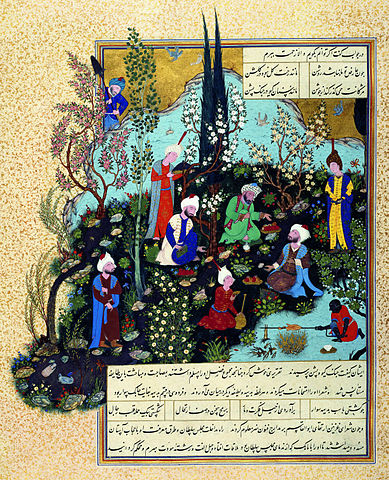*Image Credit: Wikimedia Commons Throughout the history of civilization, humans have been known to relate important lessons or describe ancient history using words. While Western societies might point to the Greek author Homer as a father of the literary medium, Persians would identify Ferdowsi or Firdausi as the chief architect of their tradition, pointing in particular to his epic poem Shahnameh, finished on March 8, 1010. Loosely translated as “Book of Kings,” it offers an account of the twists and turns of Persia from the beginning of time until his day. Born around 940, Ferdowsi grew up as part of a landowning family near the city of Tus, located in what is today northeastern Iran. A devout Muslim, his position as a member of the wealthy elite gave him connections to the Samanid emirs who ruled much of southcentral Asia from approximately 819 to 999. Eager to help the region rediscover its roots after the removal of Arab influence, the Samanids encouraged the educated class to participate in a new flowering of Iranian culture. A group of scholars took a shot at creating the Shahnameh about halfway through the Samanid reign, finishing the pre-Ferdowsi version around 957. Tasked with continuing work started by his predecessor Daqiqi, Ferdowsi began writing his interpretation of the histories in 977. Some 17 years later, he completed the first draft and presented it to Mansur, the Samanid prince in charge of Tus at the time. Within a few years, conflict broke out in the region once again. Turkish tribes led by Mahmud of Ghazni swept into eastern Persia and conquered the Samanids in 999, leaving Ferdowsi to curry favor with a new ruler in order to have his work paid for. Despite a lack of interest in true Persian history, Mahmud is said to have offered the poet a gold piece for every couplet of the Shahnameh if Ferdowsi would rewrite the text to cast the Ghaznavids in a positive light. (Ferdowsi allegedly ignored him at first, lampooning Mahmud and going into hiding to compose the final, more favorable text.) During the last decade of his revisions, Ferdowsi uses the story almost as a personal journal, describing the struggles of aging and his grief over the death of his son. Composed predominantly of legend mixed with facts, the story has gone on to become the national epic of Iran, describing the origins of Persia and winding its way into his time through 60,000 lines. Aged 70 when he finished his Shahnameh, Ferdowsi lived another ten years before dying near his birthplace in Tus. Legend leaves out most of the details for the remainder of his life, noting only that final delivery of Mahmud’s payment for the writing arrived after Ferdowsi succumbed to a heart attack. As a testament to his influence, the local governor ordered a massive mausoleum constructed to house his remains that still stands today. Considering the language of the beautifully illustrated text is written in Persian only, it remains a readable pride point for Iranians today. Though imitators made their own versions in the generations that followed, Ferdowsi’s Shahnameh continues to be regarded as the central expression of Persian culture due to its links between the classical period and modern times. Such emphasis on the importance of Ferdowsi’s work gained steam in the 1920s with Iran under the leadership of Reza Shah Pahlavi, a former soldier who took great pains to eliminate all traces of Arabian and Turkish effects on the nation’s culture. Also On This Day: 1618 – Johannes Kepler discovers the third law of planetary motion 1817 – The New York Stock Exchange is founded 1910 – Raymonde de Laroche becomes the first woman to receive a pilot’s license 1983 – President of the United States Ronald Reagan calls the Soviet Union an “evil empire” at the National Association of Evangelicals in Orlando, Florida 2004 – The Governing Council of Iraq signs a new constitution You may also like : March 8, 1917: the February Revolution began in Russia
March 8 1010 – Persian Poet Ferdowsi Completes the Epic Shahnameh
*Image Credit: Wikimedia Commons Throughout the history of civilization, humans have been known to relate important lessons or describe ancient history using words. While Western societies might point to the…
